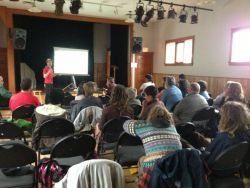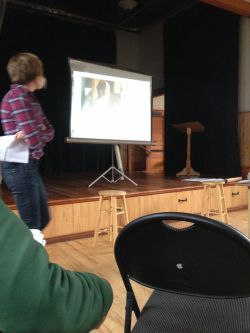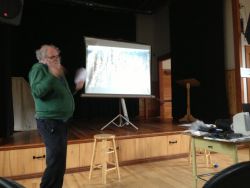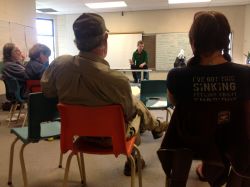Rising Tide: Building Resistance Tour holds Community Events in Unceded Wet'suet'en Territory, May 11-12
BLOG POST about EducationIndigenousSolidarity posted on May 16, 2013 by Rising_Tide-Vancouver_Coast_Salish_Territories
On Saturday night we finally had the opportunity to share the presentation we’ve developed at a community dinner in Smithers. The event brought in people from the community as well as volunteers working at the Unist’ot’en Spring Work camp. Our presentation aimed to emphasize the connections between PTP and Fracking in North Eastern BC as well as the tar sands pipelines, site C Dam, and other industrial resource extraction projects in B.C.
The voices of people in the room were strong and hopeful, but frustrations around some of the difficulties of community organizing were also expressed . Several grassroots Wet’suwet’en refuse to let their way of life and relationship to the land be threatened to such an extent that they would eventually have to tell stories of how they used to hunt or only describe the taste of moose to their grandchildren. Rather, they want future generations to have the ability to hunt for themselves as they have always done. We heard inspiring words directed at the audience saying we were not isolated from this resistance. Our involvement enables us to become part of a collective story as we take leadership from those who hold uncompromising positions to protect the lands, waters, and communities.
We were lucky to catch a visitor who had spent some time at the Tar Sands Blockade for a quick interview about Pipleline resistance across North America. Watch this interview here: Tar Sands Blockader at Unist'ot'en Camp
Later that evening we were honoured to be able to interview Molly and Cody who were hosting our group in their home. They both spoke about the challenges of organizing in communities divided by industry and they were able to clarify for us the differences between traditional Wet’suwet’en governance and the imposed colonial band council system. Watch the interview here: Rising Tide Interviews Grassroots Wet'suet'en
The following day we stopped in Burns Lake for another community event, breaking up the nine hour drive to Dawson Creek. In this community we heard about people experiencing the repercussions of organizing against pipelines when so many around them have been bought off by industry. There were discussions about how solidarity and support could be built locally and in other communities given the attacks people were facing as they courageously stood in the way of projects threatening to destroy the land. We learned that activism can be complicated in small towns where everyone knows each other, where families can often be divided to further corporate and industry interest. We have gained a tremendous amount of respect for these people who aren’t afraid to fight these issues despite the fact that it can be deeply challenging.
Resistance to the Pacific Trails Pipeline is strong and growing stronger. We leave this community in the spirit of hope, and travel now to Treaty 8 territory where Oil and Gas industry has begun to eat away at life and balance.
The site for the Vancouver local of The Media Co-op has been archived and will no longer be updated. Please visit the main Media Co-op website to learn more about the organization.



